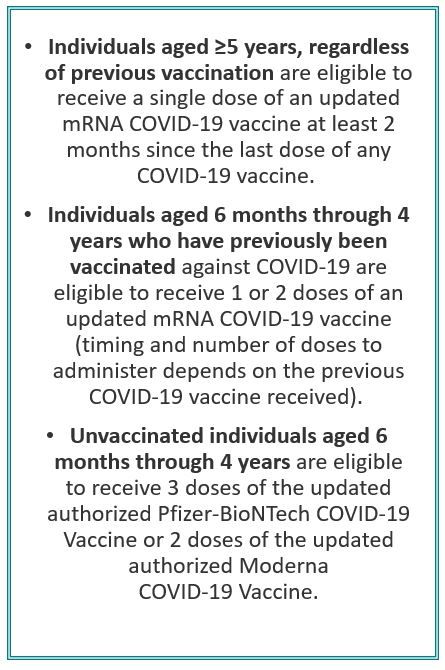- Clinical Technology
- Adult Immunization
- Hepatology
- Pediatric Immunization
- Screening
- Psychiatry
- Allergy
- Women's Health
- Cardiology
- Pediatrics
- Dermatology
- Endocrinology
- Pain Management
- Gastroenterology
- Infectious Disease
- Obesity Medicine
- Rheumatology
- Nephrology
- Neurology
- Pulmonology
FDA Approves Updated COVID-19 Monovalent Vaccines for 2023-2024
As COVID-19 hospitalizations increase at the opening of the respiratory virus season, the first "seasonal" vaccine against the virus is ready for roll-out, says the FDA.
The US Food and Drug Administration (FDA) today announced1 approval of COVID-19 vaccines from Pfizer-BioNTech and Moderna that are formulated to more closely match currently circulating SARS-CoV-2 variants.
The updated vaccines include a monovalent component that corresponds to the Omicron variant XBB.1.5, the dominant strain identified in the US during the early summer. Experts believe that the new formulation will also protect against 2 recent XBB descendants, the now-dominant EG.5 variant and the FL1.5.1 strain, according to the FDA annoucement.1 Pfizer and Moderna have each reported that the new monovalent vaccines also proved potent against the BA.2.86 subvariant that carries more than 30 additional mutations compared to its original lineages.2
The updated mRNA vaccines are each approved for individuals 12 years of age and older and are authorized under emergency use for individuals 6 months through 11 years of age…the agency’s benefit-risk assessment demonstrates that the benefits of these vaccines for individuals 6 months of age and older outweigh their risks.1
The Advisory Committee on Immunization Practices of the Centers for Disease Control and Prevention will meet on Tuesday September 12, to formulate final clinical recommendations about who should receive the updated shots and to consider guidance for vulnerable populations.1

The manufacturers have both announced that the updated vaccines would be ready for distribution this fall and given the near certainty of the CDC director’s endorsement tomorrow, millions of doses will be sent nationwide within days to pharmacies, clinics, and health systems, the FDA said.1
Accordingly, the FDA also announced that "as part of today’s actions, the bivalent Moderna and Pfizer-BioNTech COVID-19 vaccines are no longer authorized for use in the United States."
“Vaccination remains critical to public health and continued protection against serious consequences of COVID-19, including hospitalization and death,” said Peter Marks, MD, PhD, director of the FDA’s Center for Biologics Evaluation and Research, in the statement. “The public can be assured that these updated vaccines have met the agency’s rigorous scientific standards for safety, effectiveness, and manufacturing quality. We very much encourage those who are eligible to consider getting vaccinated.”
According to the FDA, persons who receive the updated monovalent vaccines should expect side effects similar to those reported with the previous bivalent formulations and that are described in the respective labeling or fact sheets.1
Not a "booster"
US officials have been careful not to identify the new shots as “boosters” to the previous vaccines, opting to “recast them as an annual immunization effort akin to the flu vaccine,” according to reporting in the New York Times.3 In fact, the FDA’s Vaccines and Related Biological Products Advisory Committee plans to convene an annual open session to select components of the COVID-19 vaccine based on circulating strains just as it has done for influenza for decades.1,2
The news while highly anticipated is now in synch with the opening weeks of the 2023-34 respiratory virus season. According to the latest data from the CDC,4 COVID-19-related hospitalizations have climbed for the past 7 weeks, rising more than 15% for the week ending August 26, to 17 418. The numbers are concerning but officials note are significantly lower than those seen during the surge of summer 2022, when hospitalizations topped 40 000.4
